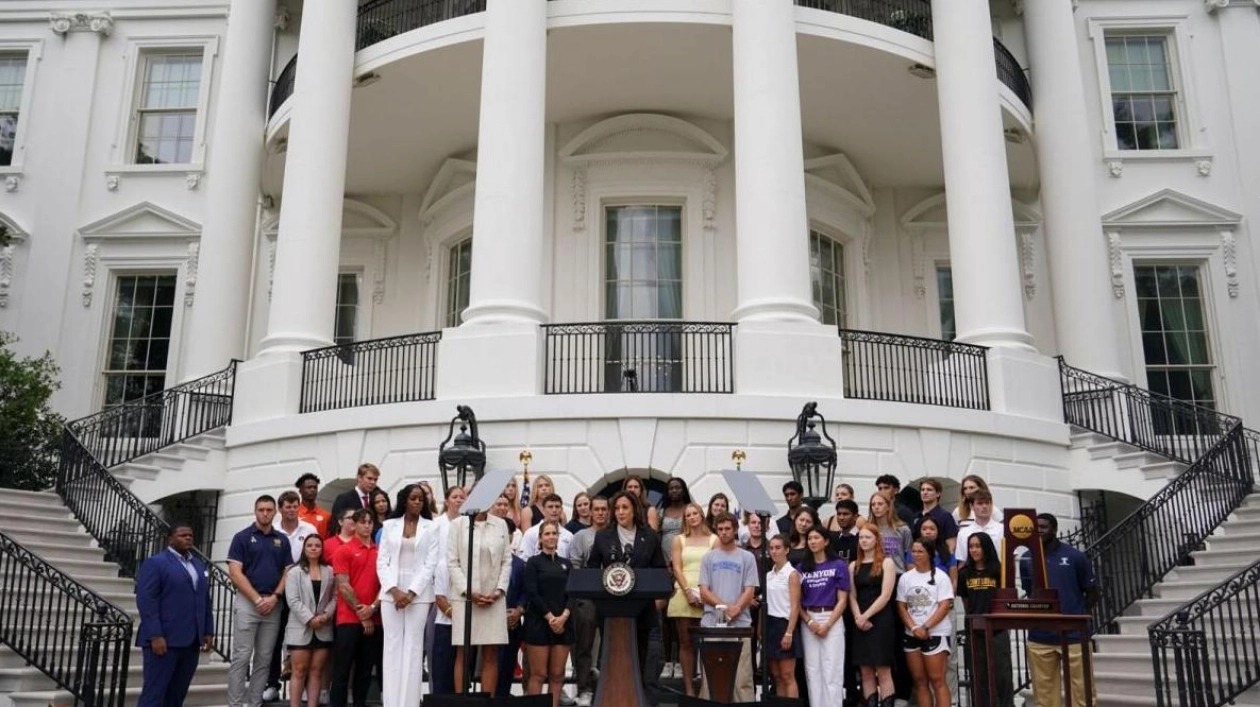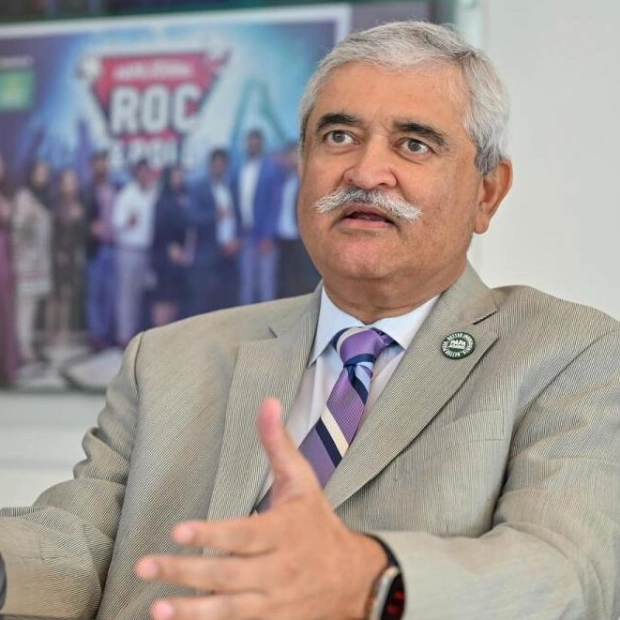US Vice-President Kamala Harris made her inaugural public appearance on Monday since joining the presidential race, following President Joe Biden's sudden withdrawal from his re-election campaign and his endorsement of her as his successor.
"Joe Biden's legacy over the past three years stands unparalleled in contemporary history," Harris stated, before addressing a White House event to celebrate collegiate athletes. Harris quickly moved to secure the Democratic presidential nomination after Biden's announcement on Sunday that he was stepping down, succumbing to pressure from fellow Democrats.
Almost all prominent Democrats previously considered potential rivals to Harris have now rallied behind her, including Michigan Governor Gretchen Whitmer, California Governor Gavin Newsom, and Kentucky Governor Andy Beshear. Campaign officials and supporters have already initiated hundreds of calls on her behalf, encouraging delegates to the upcoming Democratic Party convention to support her nomination for the November 5 presidential election against Republican Donald Trump.
Biden's exit marks the latest disruption in a tumultuous White House race that saw the near-assassination of former President Trump and the nomination of U.S. Senator J.D. Vance as Trump's running mate. "My goal is to secure and win this nomination," Harris declared in a statement on Sunday. "I am committed to uniting the Democratic Party and our nation to defeat Donald Trump."
Harris, who is of Black and Asian American heritage, would present a stark generational and cultural contrast to Trump, 78. The Trump campaign has been anticipating her potential ascent for weeks, according to sources. It released a comprehensive critique of her stance on immigration and other issues on Monday, accusing her of being more liberal than Biden.
The Trump campaign criticized Harris for advocating the abolition of the U.S. Immigration and Customs Enforcement agency, decriminalizing border crossings, supporting the Green New Deal, endorsing the administration's electric vehicle mandates, and promoting "defund the police" initiatives. Some of these positions were adopted by Harris during her unsuccessful 2020 presidential bid when she pursued a more liberal agenda than Biden, but were not endorsed by the administration, particularly regarding border security and law enforcement.
Biden, the oldest individual to ever hold the presidency, stated he would continue in office until his term concludes on January 20, 2025, while endorsing Harris to run in his stead. Biden's lackluster performance in the June 27 debate against Trump prompted fellow Democrats to urge him to withdraw, but senior Republicans demanded his resignation, arguing that if he is unfit to campaign, he is unfit to govern.
Harris spent Sunday engaging in phone calls, clad in a Howard University sweatshirt and enjoying pizza with anchovies, as she spoke with Pennsylvania Governor Josh Shapiro, a potential vice presidential candidate, House Democratic leader Hakeem Jeffries, and Congressional Black Caucus chair Representative Steven Horsford, according to sources. Biden's departure leaves less than four months for the campaign. Trump, who falsely claimed that his 2020 defeat by Biden was due to fraud, questioned Democrats' right to change candidates on Monday.
Despite the initial support for Harris, discussions of an open convention at the Democratic gathering in Chicago from August 19-22 persisted. Former House Speaker Nancy Pelosi and former President Barack Obama did not announce endorsements, although both commended Biden. With Democrats venturing into unexplored territory, Democratic National Committee Chair Jaime Harrison stated that the party would soon outline the next steps in its nomination process.
Biden secured the party's nomination in 2020, selected Harris as his vice president, and subsequently defeated Trump. She is a former California attorney general and U.S. senator. Harris is expected to largely adhere to Biden's foreign policy strategy on issues such as China, Iran, and Ukraine, but may adopt a firmer stance on the Gaza conflict with Israel if she secures the Democratic nomination and wins the November election.
Harris has been vocal on abortion rights, an issue that appeals to younger voters and more liberal Democrats. Advocates argue that she would invigorate these voters, solidify Black support, and bring formidable debating skills to challenge the former president. However, some Democrats expressed concerns about a Harris candidacy, partly due to the long history of racial and gender discrimination in the U.S., which has yet to elect a woman president in its nearly 250-year history.
Polling indicates that Harris performs statistically similarly to Biden against Trump. In a direct comparison, Harris and Trump were tied at 44% support each in a July 15-16 Reuters/Ipsos poll conducted shortly after the July 13 assassination attempt on Trump. Trump led Biden 43% to 41% in the same poll, though the 2-point difference was insignificant given the poll's 3-point margin of error.
Biden's campaign had $95 million in reserve at the end of June, according to a Federal Election Commission filing. Trump's campaign concluded the month with $128 million. Campaign finance law experts are divided on how easily this money could be transferred to a Harris-led campaign. Harris' campaign raised $49.6 million in less than 24 hours after Biden's withdrawal, a campaign spokesperson announced on Monday.
Over 44,000 Black women and supporters, including Representatives Maxine Waters, Jasmine Crockett, and Joyce Beatty, participated in a three-hour call on Sunday evening in support of Harris's bid, raising over $1.5 million for her presidential campaign, organizers reported to Reuters. Biden has not been seen in public since testing positive for Covid-19 on Wednesday. He was isolating at his home in Rehoboth Beach, Delaware, and tentatively plans to meet Israeli Prime Minister Benjamin Netanyahu on Tuesday if he has recovered.






